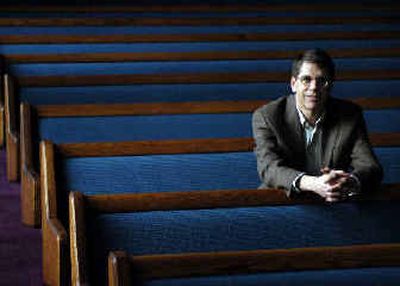Conference explores intelligent design

As a microbiologist, Scott Minnich of the University of Idaho continues to be amazed by the complexity of organisms.
Take, for instance, bacterial flagellum, a focus of Minnich’s numerous experiments and studies. Made up of 40 parts that self-assemble into a rotary engine, the microscopic organism is far more intricate than any motor a human can build, he said.
“The inference is that there’s an engineer out there, a very ingenious one,” Minnich said.
This has led Minnich and many others to reach a controversial conclusion: Nature points to an intelligent cause, they say.
And for some, that intelligent cause is God.
Intelligent design – a growing movement that teaches living things are too complex to have simply happened and must have been planned – recently has been a contentious issue among scientists, religious leaders, newspaper columnists and even public school districts. This Saturday, it’s the topic of discussion during a conference at Fourth Memorial Church in Spokane.
Several hundred people from throughout the area are expected to attend this daylong event sponsored by four area churches – Fourth Memorial, Mt. Spokane Church in Mead, Life Center in Spokane and His Place in Post Falls. Much of the material will come from the Center for Science and Culture at the Discovery Institute, a Seattle think tank that is attempting to change the way evolution is taught.
Speakers for the conference will include Minnich, Stephen C. Meyer, a former Whitworth College professor and now the director and senior fellow at the Discovery Institute, and others involved in science and theology. Participants have been encouraged to bring along skeptical friends as they explore this controversial topic, according to organizers.
While intelligent design proponents say it’s an alternative to Darwinism, critics have described it as creationism masquerading as science.
“The integrity of science education is best supported by presenting the successes of actual science rather than highlighting philosophical attempts to defend the boundaries of proper science,” wrote Matt Young and Taner Edis, authors of a book titled “Why Intelligent Design Fails.” “Intelligent design, like older versions of creationism, is not practiced as science. Its advocates act more like a political pressure group than like researchers entering an academic debate.”
But intelligent design isn’t creationism, proponents say.
“This is not trying to get Genesis back on the dialogue in schools,” explained Minnich, one of 20 U.S. scientists who spent several months in Iraq last year searching for weapons of mass destruction. “It’s about opening the dialogue.”
The conference is being organized by several local pastors and members of a group called the Greater Northwest Apologetics Team. Founded by the Rev. John Repsold of Fourth Memorial, GNAT began about a year ago as a way to “stretch people intellectually while building their faith,” he said. Apologetics – the branch of theology that deals with the defense and proof of Christianity – can be a tool for Christians who often encounter opposition in the secular world, Repsold said.
Unlike creationism, which begins with the premise that there is a God, intelligent design starts from scientific evidence and moves in the direction of belief in a creator, Repsold said. It’s not necessarily anti-evolution, he stressed, since many members of the Intelligent Design camp also believe that organisms have changed over time.
The main difference between evolution and intelligent design, however, lies in the concept of randomness. Intelligent design proponents challenge Darwin’s theory that natural selection was random and without a purpose.
“There are signs of intelligence in all aspects of our scientific endeavors,” said Dan Croskrey, chairman of the intelligent design conference. “It points to the very intelligence that the Bible tells us about.”
Croskrey, an engineer and member of Newman Lake Missionary Baptist Church, said he struggled for years between the apparent conflict between faith and science. Intelligent design, he said, helped him realize that the two can go hand in hand.
The Bible, after all, challenges people to test all things and hold fast that which is good, said Croskrey.
“If an intelligent being is going to send us a message like the ones in the Bible, he will give a separate source to verify this,” he said. That’s where nature comes in.
“God’s word and God’s world – they can’t conflict,” said Croskrey. “They’re telling us the same basic story.”
The problem with intelligent design, however, is that even though it may lead some to conclude that an intelligent being must be responsible for creation, there’s no way it can verify there is such a thing as God. Repsold and others acknowledge that.
“Science cannot use scientific principles to prove metaphysical issues,” the pastor said. “Science will never prove the existence of God, but it will hopefully point to his fingerprints all over the universe.”
True science explores every possibility, said Minnich. But Darwinism automatically concludes evolution was a random process and that there is no intelligent being involved. An agnostic for many years, Minnich wasn’t satisfied with Darwin’s theories whenever he asked, “Is natural selection sufficiently creative to account for the cell? Can natural selection, undirected, have the creative power to produce these things?”
Drawn to the beauty and complexity of organisms, he continued to explore science. “As I got into the biology, I converted to theism,” Minnich said.
For Repsold and others, being a true believer in God involves science.
“Faith is all about questions,” said Repsold. “God welcomes questions and he’s big enough for them.”